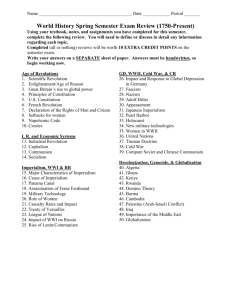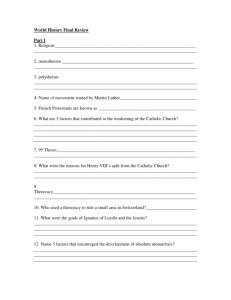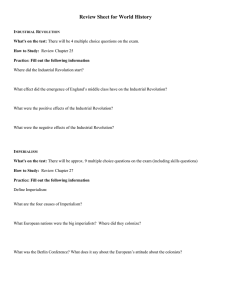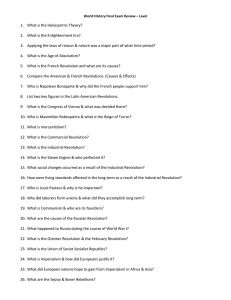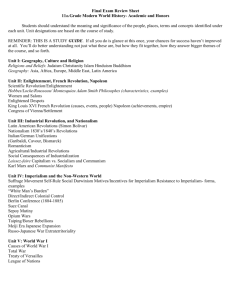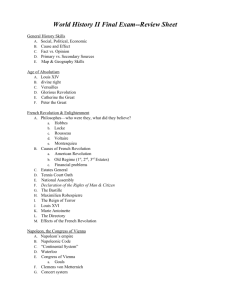Pre-AP World History Spring Semester Exam Review
advertisement
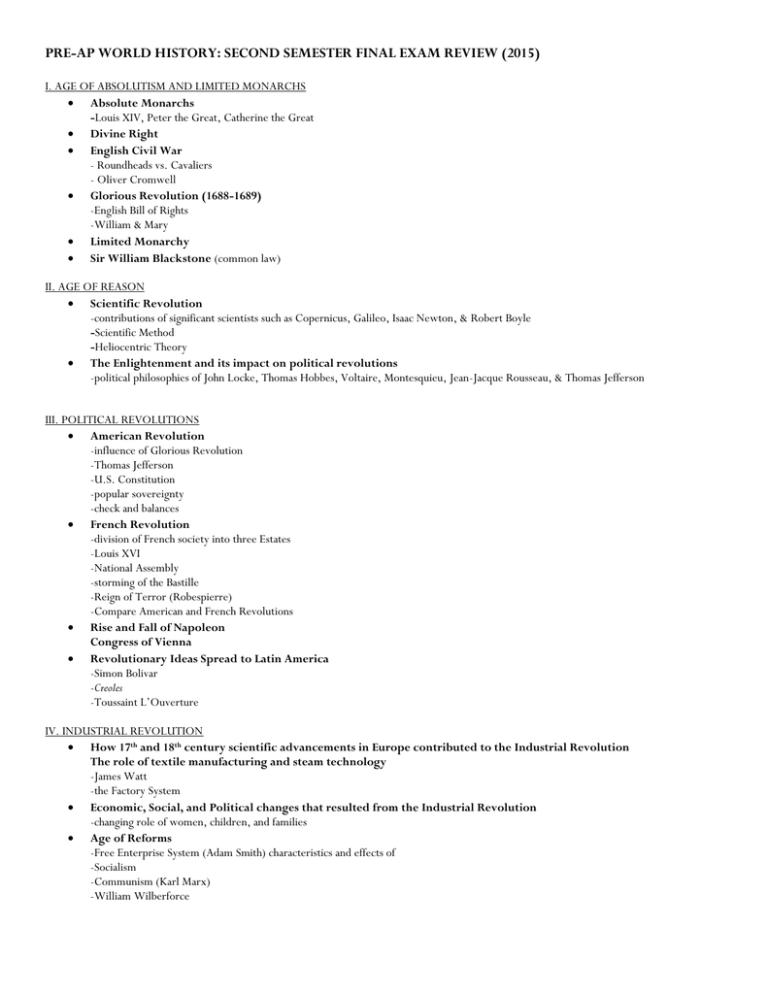
PRE-AP WORLD HISTORY: SECOND SEMESTER FINAL EXAM REVIEW (2015) I. AGE OF ABSOLUTISM AND LIMITED MONARCHS Absolute Monarchs -Louis XIV, Peter the Great, Catherine the Great Divine Right English Civil War - Roundheads vs. Cavaliers - Oliver Cromwell Glorious Revolution (1688-1689) -English Bill of Rights -William & Mary Limited Monarchy Sir William Blackstone (common law) II. AGE OF REASON Scientific Revolution -contributions of significant scientists such as Copernicus, Galileo, Isaac Newton, & Robert Boyle -Scientific Method -Heliocentric Theory The Enlightenment and its impact on political revolutions -political philosophies of John Locke, Thomas Hobbes, Voltaire, Montesquieu, Jean-Jacque Rousseau, & Thomas Jefferson III. POLITICAL REVOLUTIONS American Revolution -influence of Glorious Revolution -Thomas Jefferson -U.S. Constitution -popular sovereignty -check and balances French Revolution -division of French society into three Estates -Louis XVI -National Assembly -storming of the Bastille -Reign of Terror (Robespierre) -Compare American and French Revolutions Rise and Fall of Napoleon Congress of Vienna Revolutionary Ideas Spread to Latin America -Simon Bolivar -Creoles -Toussaint L’Ouverture IV. INDUSTRIAL REVOLUTION How 17th and 18th century scientific advancements in Europe contributed to the Industrial Revolution The role of textile manufacturing and steam technology -James Watt -the Factory System Economic, Social, and Political changes that resulted from the Industrial Revolution -changing role of women, children, and families Age of Reforms -Free Enterprise System (Adam Smith) characteristics and effects of -Socialism -Communism (Karl Marx) -William Wilberforce V. NINETEENTH CENTURY PROGRESS Contributions of significant scientists and inventors -Thomas Edison, Louis Pasteur, Marie Curie, Charles Darwin VI. NEW IMPERIALISM Causes and effects of European Imperialism -the role of military technology, transportation, communication and medicine in advancing 19th century imperialism -scramble for Africa (Berlin Conference) -Informal Imperialism of China How imperialism was connected to the development of capitalism Reactions to imperialism -Sepoy Rebellion and Boxer Rebellion VII. WORLD WAR I/RUSSIAN REVOLUTION Causes and effects of World War I Major characteristics of World War I -the Balkan Powder Keg -total war -trench warfare -new weapons -Schlieffen Plan -Allies vs. Central Powers (know who was on each side) -mass murder of Armenians Impact of Woodrow Wilson’s Fourteen Points and the Treaty of Versailles -Mandate System -League of Nations Causes of the 1917 Russian Revolution its effect on World War I -Czar Nicholas II -Lenin -Bolsheviks -Civil War (Reds vs. Whites) VIII. BETWEEN THE WARS/WORLD WAR II The Great Depression -causes and impact of -how the U.S. responded -why the Soviet Union was not effected Rise of Totalitarianism -Benito Mussolini in Italy (fascism) -Adolf Hitler in Germany (Nazism) -Joseph Stalin in U.S.S.R. (Communism) Major Causes and Events of World War II -Munich Conference -German invasion of Poland -Japanese imperialism and attack of Pearl Harbor (Hideki Tojo) -the Holocaust -Normandy landings -dropping of the atomic bombs -reasons for Allied victories Roles of various world leaders during the war -Winston Churchill, Franklin Roosevelt, Mussolini, Hitler, Stalin, Tojo IX. POST WORLD WAR (1946-1990) How the outcome of WWII contributed to the development of the Cold War Stalin’s actions in Eastern Europe -“iron curtain” Factors that contributed to Communism in China -Mao Zedong’s role and how it differed from Soviet communism Identify major events of the Cold War -Truman Doctrine, Containment, Korean War, arms race, Berlin Wall, Cuban Missile Crisis, Vietnam War Identify examples of politically motivated mass murders in Cambodia, China, and Soviet Union -Pol Pot (Cambodia) Explain why communist command economies collapsed in competition with free-market economies Explain the roles of modern world leaders in the collapse of communism in Eastern Europe -Ronald Reagan, Margaret Thatcher, Mikhail Gorbachev, Lech Walesa, and Pope John Paul II X .INDEPENDENCE MOVEMENTS Summarize the rise of independence movements in Africa, the Middle East, and South Asia and reasons for ongoing conflict -Ho Chi Minh (Vietnam) -Mohandas Gandhi (India) -Kwame Nkrumah (Ghana) -Nelson Mandela (South Africa) Explain how Arab rejection of the State of Israel has led to ongoing conflict Identify examples of individuals who led resistance to political oppression such as -Mandela, Gandhi, Oscar Romero, Nathan Sharansky, Las Madres de La Plaza de Mayo, & Chinese students at Tiananmen Square XI. MODERN GLOBAL CONFLICTS Summarize the development and impact of radical Islamic fundamentalism on events in the second half of the 20 th century -1979 Iranian Revolution -Al-Qaeda (Osama bin Laden, 9/11 attacks) Identify examples of genocide including the Balkans, Rwanda, and Darfur Describe the social and economic impact of 20th century globalization Spring 2015 Essay Questions: Two of the following will be chosen on the day of your exam and you will have to write about one of them. Essays should be well thought out, logical, and detailed. This will count for 20% of your grade. 1. List and describe three specific examples of challenges the modern world faces today. 2. Compare the causes, characteristics and consequences of the American and French Revolutions. 3. List and explain the four fundamental causes of World War I and the immediate cause. 4. Summarize how the outcome of World War II contributed to the development of the Cold War. Give specific examples of the Cold War. 5. Define and give examples of 18th & 19th century imperialism. Discuss the positive and negative impacts of colonial rule. The test has: 108 multiple choice questions (four choices each) 17 matching (people) 125 x 0.64 each = 80 pts. 1 essay x 20 pts.= 20 pts.
